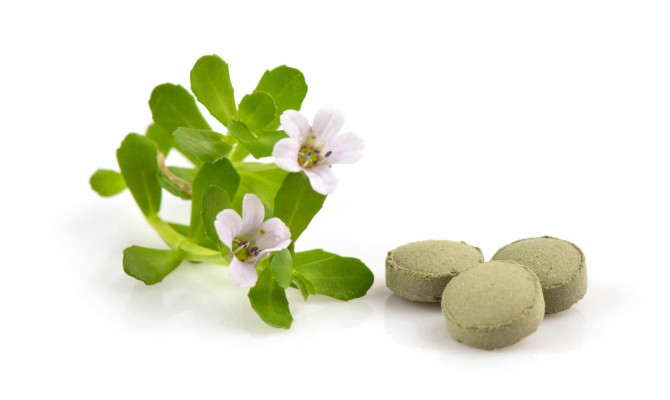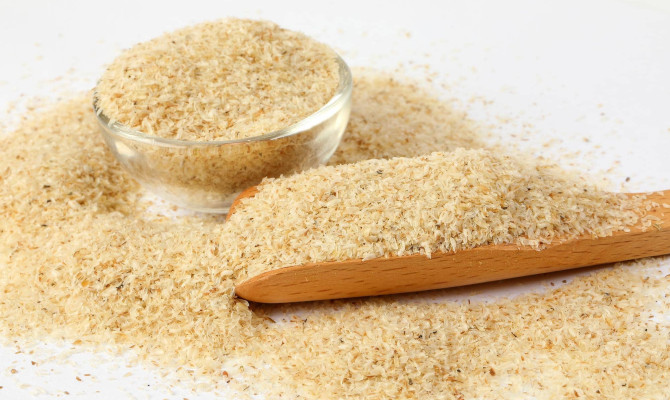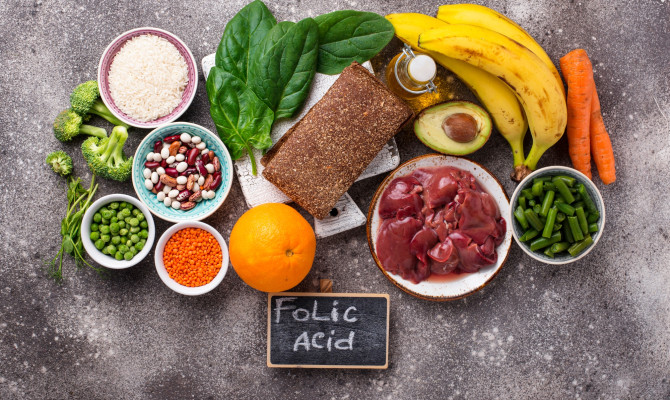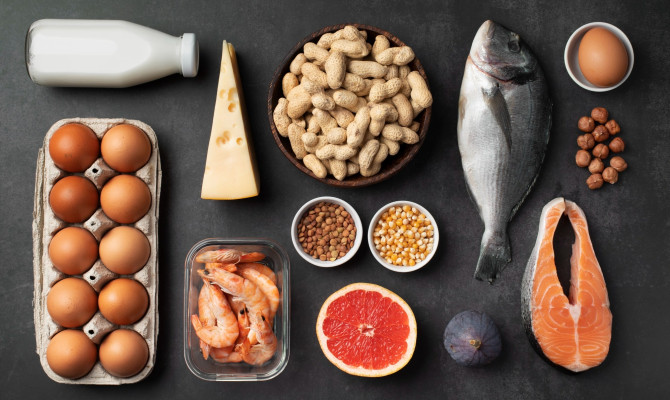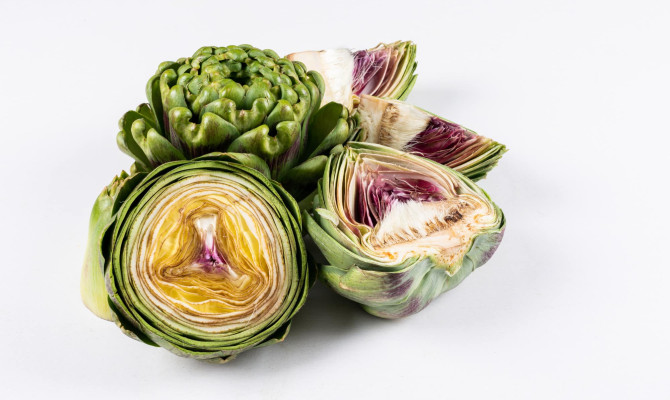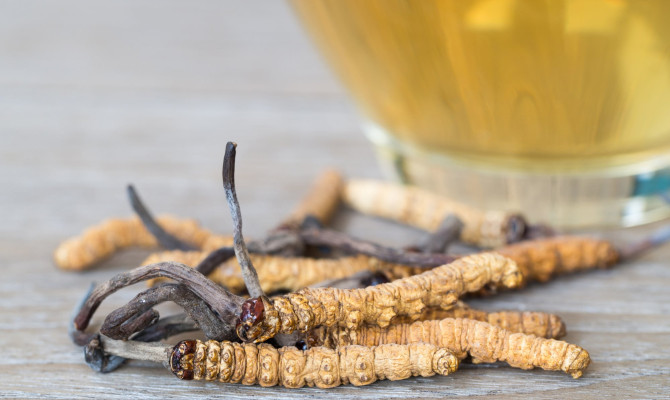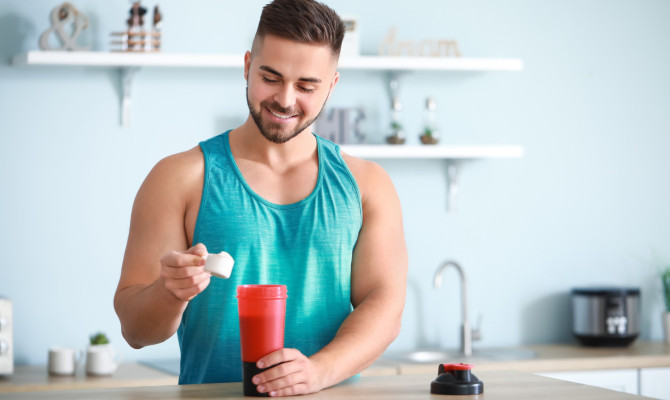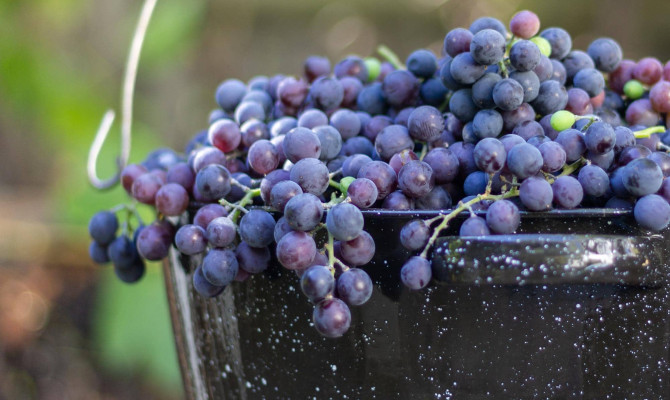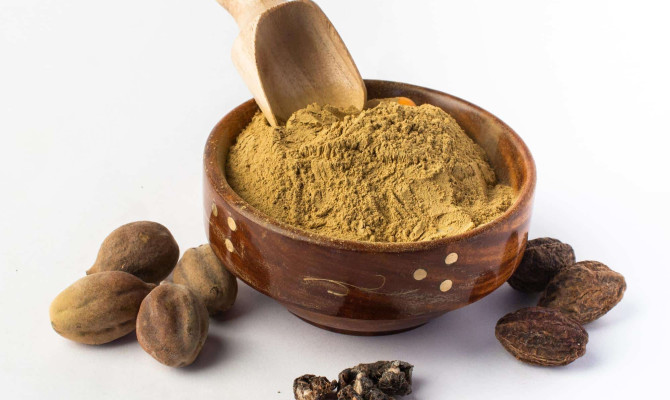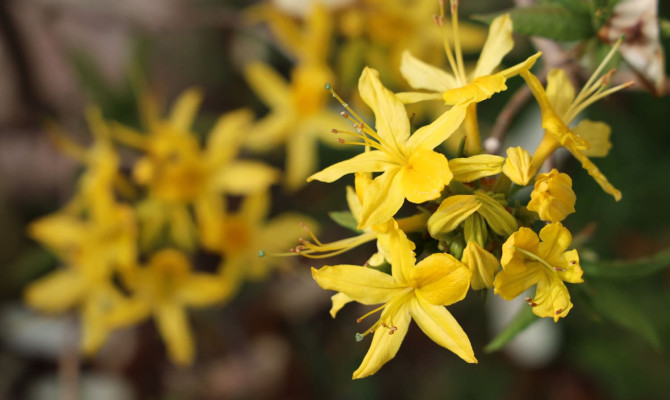Hibiscus : Benefits, Precautions, and Interactions

- Hibiscus
- 16 Aug 2023
Overview
What is Hibiscus?
Hibiscus is a perennial flowering plant belonging to the family Malvaceae. Hibiscus has over 300 species of plants, including shrubs, herbs, and trees.
Among them, Hibiscus sabdariffa (common name: Roselle) is the most widely cultivated shrub. It has a red stem and big yellow flowers that turn red or pink. It is a versatile plant with multiple health benefits and is native to Malaysia and India.
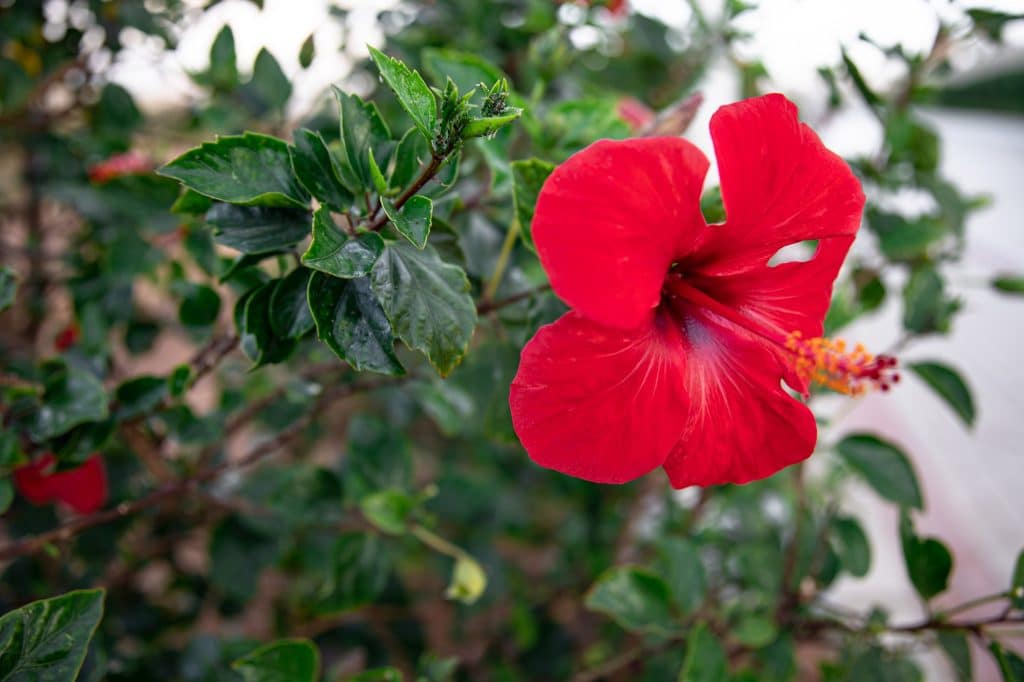
Facts of Hibiscus
- Hibiscus grows in regions with warmer climates, such as China, Nigeria, Sudan, Thailand, and Mexico.
- Hibiscus is cultivated for its flowers, leaves, seeds, stems, and roots
- Hibiscus seed oil and flowers are widely used in cosmetics, food, and medicinal preparations.
- The FDA (Food and drug administration, United States) approves using Hibiscus supplements, but they consider them food rather than medicines 1Overview| Researched based study from Sciencedirect.com ,2Overview| Researched based study from Nlm.nih.gov .
Nutritional Value
Nutritional Value of Hibiscus
Raw Hibiscus contains the following
- Carbohydrate
- Magnesium
- Vitamin B2(Riboflavin)
- Vitamin B3(Niacin)
- Vitamin B1(Thiamine)
- Vitamin C
- Calcium
- Iron
Bioactives in Hibiscus
Flavonoids
- Flavonoids are responsible for the red color of the flower
Anthocyanins
- Anthocyanins are natural water-soluble pigment-containing phenolic compounds.
Phenolic acids
- Phenolic acids are natural compounds present in plants for defense purposes.
Organic acids
- Organic acids are natural compounds in plants for carrying out various cell processes.
The compounds mentioned above have antioxidant properties and protect our bodies from free radicals and cell damage 3Nutritional Value| Researched based study from Usda.gov
Properties of Hibiscus
- Antioxidant(reduces the oxidative stress in the body)
- Antibacterial (can prevent or stop the growth of bacteria)
- Anti-cancer(prevents abnormal cell growth)
- Anti-pyretic(brings down the body temperature)
- Anti-spasmodic (relieves muscle pain) 4Nutritional value| Researched based study from Sciencedirect.com
Benefits
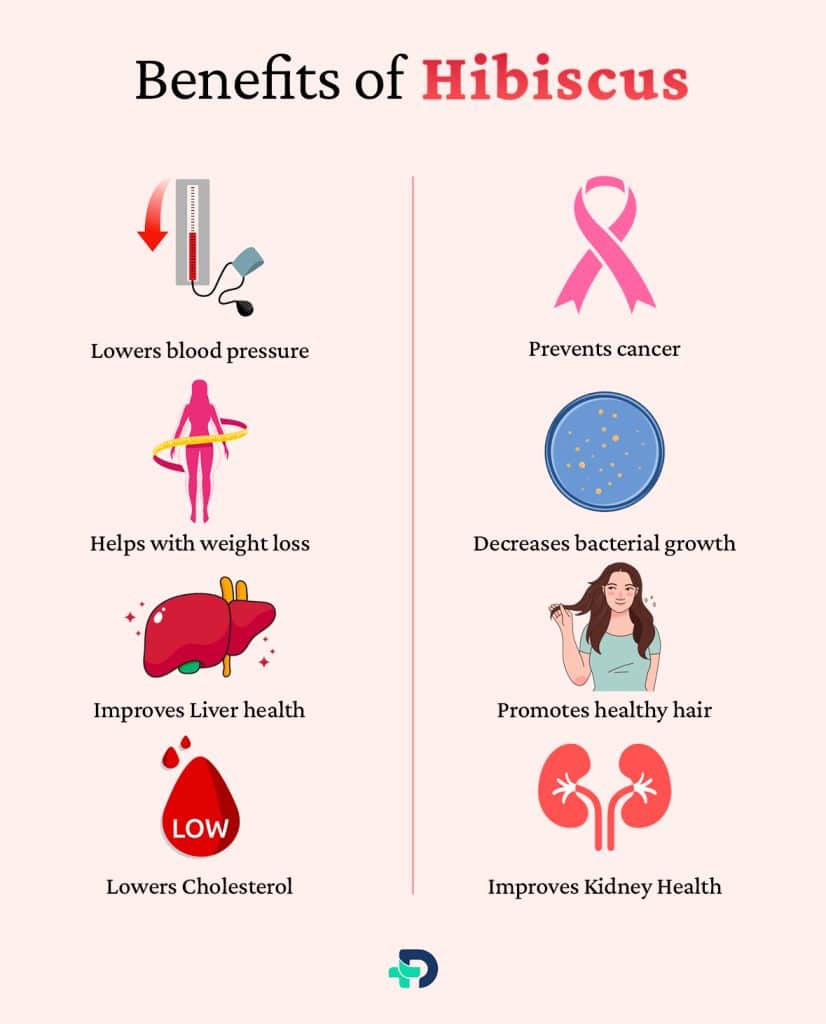
Benefits of Hibiscus
The health benefits of Hibiscus are as follows
- Lowers blood pressure
- Helps with weight loss
- Improves Liver health
- Lowers cholesterol
- Prevents cancer
- Decreases bacterial growth
- Promotes healthy hair
- Improves Kidney Health
Lowers blood pressure
- Hibiscus tea decreases both the systolic and diastolic blood pressure
- It decreases the risk of heart diseases 5Benefits| Researched based study from Nlm.nih.gov
Helps with weight loss
- Hibiscus tea reduces body weight, body mass index, and waist circumference
- It reduces the abdominal fat
- It decreased the appetite 6Benefits| Researched based study from Nlm.nih.gov
- However, more research is warranted to prove the effect of Hibiscus on weight loss.
Improves Liver health
- Hibiscus extract decreases the liver fat
- It reduces the risk of liver damage 7Benefits| Researched based study from Nlm.nih.gov
Lowers Cholesterol
- Hibiscus tea decreased the level of total cholesterol
- It decreases the risk of heart diseases 8Benefits| Researched based study from Nlm.nih.gov
Prevents cancer
- Hibiscus extract reduced the growth of mouth and plasma cancer cells
- It prevented the spreading of human prostate cancer cells 9Benefits| Researched based study from Nlm.nih.gov
- However, more research is warranted to prove the effect of Hibiscus on cancer.
Decreases bacterial growth
- Hibiscus extract prevents the growth of E.coli bacteria. E.coli causes gas and diarrhea in humans 10Benefits| Researched based study from Nlm.nih.gov
Promotes healthy hair
- Hibiscus leaf extract applied to the skin in animal studies enhances blood circulation.
- It affected the hair follicles, improving the hair growth 11Benefits| Researched based study from Sciencedirect.com
- However, more research is warranted in humans to prove the effects of Hibiscus leaf extract on hair health
Improves Kidney Health
- Hibiscus extract improves renal function in patients with mild to moderate hypertension.
- It increased the urine volume 12Benefits| Researched based study from Biomedcentral.com
Dosage
Dosage of Hibiscus
To date, there is no recommended dose for Hibiscus.
- Drinking Hibiscus in moderation is generally safe and well-tolerated by most people.
- Hibiscus tea has been used securely for up to 6 weeks at a dose of 24 ounces daily.
- For hypertension, the dose often used by most adults is 100 milligrams to 10 grams daily
- However, it is best to consult a healthcare professional to know the exact dose based on the health condition 13Dosage| Researched based study from Sciencedirect.com
Side effects
Side effects of Hibiscus
Hibiscus is generally safe when consumed in small amounts. However, some people might experience the following side effects:
- Headache
- Lightheadedness
- Nausea and vomiting
- Skin rash
- Buzzing sound in the ears
- Stomach gas (flatulence)
- Stomach problem
- Constipation
- Hives
- Swelling
- Itching 14Side effects| Researched based study from Nlm.nih.gov
Overdose toxicity of Hibiscus
- Liver injury
- Increased blood pressure
- Cardiac arrest (sudden stoppage of heartbeat)
Precautions
Precautions
Who should not take Hibiscus?
- Nursing mothers and young children under 12 should avoid using Hibiscus due to the lack of information on safety and efficiency in these groups.
- People with kidney disease
- People with heart disease
- Who is allergic to the Malvaceae plant family
- One on blood pressure medication
- Who are pregnant
- People planning to have a surgical operation
- People within two weeks of surgical operation 15Precautions| Researched based study from Sciencedirect.com
Consumption
Ways of Consuming Hibiscus
Hibiscus is available in the following forms
Tea form
- One can take Hibiscus as a tea by putting the dried buds in boiling water.
- Dried Hibiscus tea bags are also available to be purchased online.
Extract form
- It is the concentrated liquid form of the supplement.
- One can buy it online or from any herbal supplement retailers
Powder form
- Hibiscus powder is made from the dried plant parts
- It is finely ground, and hence one can mix it in water and take it as a beverage
Capsule form
- It is the solid oral form of the Hibiscus supplement.
- One can consume it after consulting a healthcare professional
Ways to use Hibiscus
- The raw leaves can be used as vegetables
- Hibiscus seeds can be used as an alternative to coffee
- Red calyces can be used as dyes and food colorants
- Hibiscus edible oil can be used as an alternative to castor oil
- One can use Hibiscus seed oil to produce soaps and scrubs
Some other ways of using Hibiscus
Dried or fresh calyces of Hibiscus are used in the following:
- Jam
- Jelly
- Chocolates
- Ice-cream
- Cakes
- Puddings
- Herbal drinks
- Fermented drinks
- Wine
Interactions
Interactions of Hibiscus
Chloroquine
- Chloroquine is the drug to treat or prevent malaria
- Taking Hibiscus and Chloroquine together might reduce the blood levels of Chloroquine and decreases the efficiency of the drug
Medications for high blood pressure (Antihypertensive)
- Hibiscus might lower the blood pressure
- So taking Hibiscus and antihypertensive medication together might cause the blood pressure to go too low, causing lightheadedness and fainting.
Medications for high sugar (antidiabetic)
- Hibiscus might lower the body’s blood sugar level
- Hibiscus and antidiabetic medication might make the blood sugar go too low, causing sweating, confusion, dizziness, and fainting if consume together.
Losartan
- Losartan is a medication to treat high pressure.
- Taking Hibiscus and Losartan together might increase the blood levels of Losartan in the body.
- It might increase the drug’s side effect
Diclofenac
- Diclofenac is a medication to reduce pain and swelling
- Taking Hibiscus and Diclofenac together might alter the blood levels of diclofenac in the body and increase the side effect of the drug.
Simvastatin
- Simvastatin is a medication to lower the cholesterol in our body
- Hibiscus and Simvastatin might decrease the blood levels of Simvastatin in the body
- It might reduce the efficiency of the drug if consuming together.
Medications broken down by the liver
- Taking Hibiscus may increase the side effects of drugs metabolized by the liver factors (such as cytochrome P450) by altering the liver’s ability to break down the drug.
Acetaminophen
- Acetaminophen is a drug to treat pain and fever
- Taking Hibiscus and Acetaminophen together might decrease the blood levels of Acetaminophen in the body.
- It might decrease the effectiveness of the drug 16Interactions| Researched based study from Nlm.nih.gov
Storage
Storage of Hibiscus
- One should store Hibiscus in a cool and dry place
- Keep it away from direct sunlight
- One should store it in areas out of reach of young children and kids
Takeaway
Key takeaways
- Hibiscus is a flowering plant with multiple health benefits
- Hibiscus is available in various forms, such as tea, powder, extract, and capsule
- Research studies of Hibiscus on human is minimal, and more research is wanted to know its potential benefits
- One interested in including Hibiscus in the daily diet must consult a health care professional to know the exact dose and to avoid unwanted side effects.
Any feedback on this article?
 This Articles content was accurate
This Articles content was accurate Very Informative Article
Very Informative Article I have a question or a comment
I have a question or a comment
 This article contains inaccurate content
This article contains inaccurate content This article was not helpful
This article was not helpful I have a question or a comment
I have a question or a comment
We appreciate your helpful feedback!
Checkout our social pages
References
-
Science Direct
Hibiscus - An overview | Overview
-
National Library of Medicine
Organic Acids from Roselle (Hibiscus sabdariffa L.)—A Brief Review of Its Pharmacological Effects | Overview
-
U.S. DEPARTMENT OF AGRICULTURE
Roselle, raw | Nutritional Values
-
Science Direct
Antioxidant and antibacterial activities of hibiscus (Hibiscus rosa-sinensis L.) and Cassia (Senna bicapsularis L.) flower extracts | Nutritional Values
-
National Library of Medicine
Effect of hibiscus sabdariffa on blood pressure in patients with stage 1 hypertension | Benefits
-
National Library of Medicine
Hibiscus sabdariffa extract inhibits obesity and fat accumulation, and improves liver steatosis in humans | Benefits
-
National Library of Medicine
Hibiscus sabdariffa extract improves hepatic steatosis, partially through IRS-1/Akt and Nrf2 signaling pathways in rats fed a high fat diet | Benefits
-
National Library of Medicine
Effects of Hibiscus sabdariffa extract powder and preventive treatment (diet) on the lipid profiles of patients with metabolic syndrome (MeSy) | Benefits
-
National Library of Medicine
Antitumoral Effect of Hibiscus sabdariffa on Human Squamous Cell Carcinoma and Multiple Myeloma Cells | Benefits
-
National Library of Medicine
Aqueous extract of Hibiscus sabdariffa inhibits pedestal induction by enteropathogenic E. coli and promotes bacterial filamentation in vitro | Benefits
-
Science Direct
In vivo and in vitro evaluation of hair growth potential of Hibiscus rosa-sinensis Linn | Benefits
-
BioMed Central
Does consumption of an aqueous extract of Hibscus sabdariffa affect renal function in subjects with mild to moderate hypertension? | Benefits
-
Science Direct
Hibiscus sabdariffa L. in the treatment of hypertension and hyperlipidemia: A comprehensive review of animal and human studies | Dosage
-
National Library of Medicine
Hibiscus sabdariffa in Diabetes Prevention and Treatment—Does It Work? An Evidence-Based Review | Side effects
-
Science Direct
Toxicity and Beneficial Effects of Some African Plants on the Reproductive System | Precautions
-
National Library of Medicine
Pharmacokinetic Herb-Drug Interaction between Hibiscus sabdariffa Calyces Aqueous Extract and Captopril in Rats | Interactions












